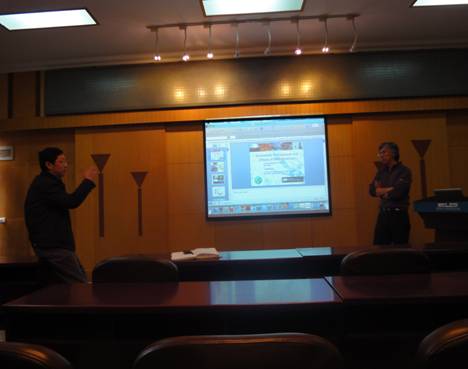
Prof. Laurie Chan giving the presentation
Invited by Prof. FENG Xinbin, Prof. Laurie Chan* from University of Northern British Columbia(UNBC), Canada visited IGCAS and gave an academic presentation in the lecture hall of State Key Laboratory of Environmental Geochemistry (SKLEG) on Nov.9, 2010.
Prof. Laurie Chan’s presentation was titled “Biomarkers for Exposure and Effects of Methylmercury”. The presentation explained the toxicology of methylmercury and described the new method of direct detection of mercury in single human hair strands by laser ablation inductively coupled plasma mass spectrometry (LA-ICP-MS) with high time resolution. The highlight of the presentation was the theory and application of the biomarkers (MAO、ChE) in the blood to refelect the neurotoxicity of methylmercury exposure.

Prof. Laurie Chan having discussion with the audience
Prof. FENG Xinbin hosted the presentation. Prof. LI Shijie, researchers, and graduate students attended the presentation and had a heated discussion with Prof. Laurie Chan at the end of his presentation.
During his visit, Prof. Chan also took a trip to Wanshan mercury mine and discussed with the members in mercury group, which will benefit their future collaboration.
*Laurie Chan, PhD. (Source from http://www.unbc.ca/chan/laurie.html)
Professor of Community Health, Dr. Donald Rix BC Leadership Chair in Aboriginal Environmental Health, University of Northern British Columbia, Prince George, BC, Canada.
Professor Laurie Chan obtained his B.Sc. and M.Sc. at the University of Hong Kong and Ph.D. from the University of London in Toxicology. Prof. Chan's research in environmental and nutritional toxicology spans from the lab developing new techniques for contaminant analysis, to participatory research in the community on the risk and benefits of traditional foods and impact of environmental change on food security. Prof. Chan has published over 100 peer-reviewed scientific papers and supervised over 60 graduate students. Prof. Chan has also served as an advisor for international and national governments and organizations and numerous Aboriginal communities on environmental health issues. He held one of the 6 NSERC Northern Research Chairs between 2002 and 2006 and was selected Leopold Fellow in recognition of his leadership in environmental sciences by Stanford University in 2008.
( Provided by LI Ping )